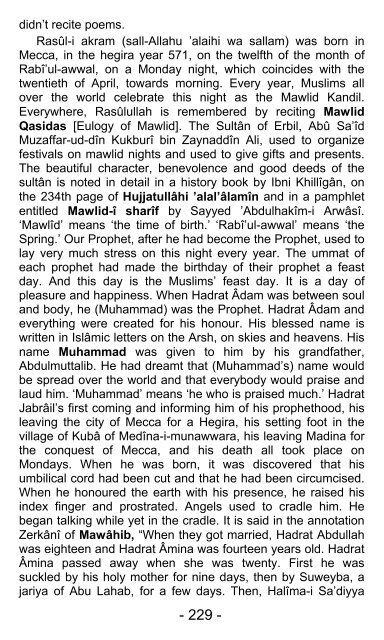1 - Endless Bliss - Hüseyin Hilmi Işık
1 - Endless Bliss - Hüseyin Hilmi Işık
1 - Endless Bliss - Hüseyin Hilmi Işık
Create successful ePaper yourself
Turn your PDF publications into a flip-book with our unique Google optimized e-Paper software.
didn’t recite poems.<br />
Rasûl-i akram (sall-Allahu ’alaihi wa sallam) was born in<br />
Mecca, in the hegira year 571, on the twelfth of the month of<br />
Rabî’ul-awwal, on a Monday night, which coincides with the<br />
twentieth of April, towards morning. Every year, Muslims all<br />
over the world celebrate this night as the Mawlid Kandil.<br />
Everywhere, Rasûlullah is remembered by reciting Mawlid<br />
Qasidas [Eulogy of Mawlid]. The Sultân of Erbil, Abû Sa’îd<br />
Muzaffar-ud-dîn Kukburî bin Zaynaddîn Ali, used to organize<br />
festivals on mawlid nights and used to give gifts and presents.<br />
The beautiful character, benevolence and good deeds of the<br />
sultân is noted in detail in a history book by Ibni Khillîgân, on<br />
the 234th page of Hujjatullâhi ’alal’âlamîn and in a pamphlet<br />
entitled Mawlid-î sharîf by Sayyed ’Abdulhakîm-i Arwâsî.<br />
‘Mawlîd’ means ‘the time of birth.’ ‘Rabî’ul-awwal’ means ‘the<br />
Spring.’ Our Prophet, after he had become the Prophet, used to<br />
lay very much stress on this night every year. The ummat of<br />
each prophet had made the birthday of their prophet a feast<br />
day. And this day is the Muslims’ feast day. It is a day of<br />
pleasure and happiness. When Hadrat Âdam was between soul<br />
and body, he (Muhammad) was the Prophet. Hadrat Âdam and<br />
everything were created for his honour. His blessed name is<br />
written in Islâmic letters on the Arsh, on skies and heavens. His<br />
name Muhammad was given to him by his grandfather,<br />
Abdulmuttalib. He had dreamt that (Muhammad’s) name would<br />
be spread over the world and that everybody would praise and<br />
laud him. ‘Muhammad’ means ‘he who is praised much.’ Hadrat<br />
Jabrâil’s first coming and informing him of his prophethood, his<br />
leaving the city of Mecca for a Hegira, his setting foot in the<br />
village of Kubâ of Medîna-i-munawwara, his leaving Madina for<br />
the conquest of Mecca, and his death all took place on<br />
Mondays. When he was born, it was discovered that his<br />
umbilical cord had been cut and that he had been circumcised.<br />
When he honoured the earth with his presence, he raised his<br />
index finger and prostrated. Angels used to cradle him. He<br />
began talking while yet in the cradle. It is said in the annotation<br />
Zerkânî of Mawâhib, “When they got married, Hadrat Abdullah<br />
was eighteen and Hadrat Âmina was fourteen years old. Hadrat<br />
Âmina passed away when she was twenty. First he was<br />
suckled by his holy mother for nine days, then by Suweyba, a<br />
jariya of Abu Lahab, for a few days. Then, Halîma-i Sa’diyya<br />
- 229 -




